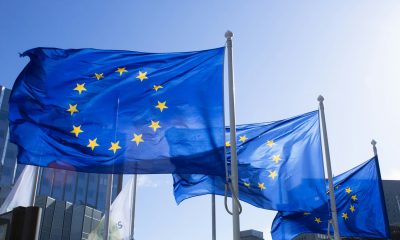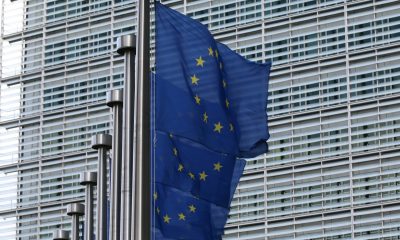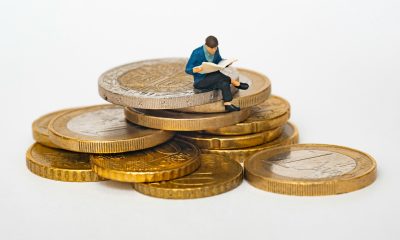Business
Eurozone GDP Growth Moderates to 0.2% in the Third Quarter
The European Commission (EC) expects the eurozone to enter recession in the last quarter of 2022 and the first quarter of 2023, according to the economic forecast update it published on Friday. The body also predicts a positive year-end for Spain, after raising its GDP growth forecast by four-tenths of a percentage point to 4.5%, an average of 1.3 points above European economies.

The European economy slows down. Eurozone gross domestic product (GDP) moderated its growth to 0.2% in the third quarter of the year, the slowest pace of growth since the first quarter of 2021, according to data released today by Eurostat. In the previous quarter, the economy of the eurozone countries had posted an expansion of 0.8%.
In the European Union (EU) as a whole, GDP growth in the third quarter also slowed to 0.2%, compared with a rise of 0.7% in the second quarter. Compared to the same period last year, GDP in the eurozone grew by 2.1% and in the EU by 2.4%.
Romania was the fastest-growing EU country in the period, up 1.3%, ahead of Poland (0.9%) and Sweden (0.7%). On the other hand, Latvia recorded the largest contraction in the group, with a fall of 1.7%, followed by Slovenia (1.4%) and Hungary (0.4%). In Spain, GDP growth in the third quarter was 0.2%, compared to an increase of 1.5% in the previous three months.
The main European economies also recorded a moderation in growth. Germany recorded an increase of 0.3% between July and September, two-tenths of a percentage point higher than in the second quarter, while the French economy rose by 0.2% and the Italian economy by 0.5%.
Born2Invest’s team of journalists gathers the most interesting economic news in a single mobile application. It’s impossible to keep up with everything you’re interested in, but our companion app will help you keep track of the important news. Our app is being updated throughout the day.
Growth in the number of employed persons also slowed to 0.2% in the eurozone
Eurostat also reported that, in the third quarter of 2022, the number of employed persons in both the euro area and the EU slowed to 0.2%, compared with the 0.4% increase recorded in the second quarter. Compared with the same quarter of the previous year, employment increased by 1.7%.
The European Commission (EC) expects the eurozone to enter recession in the last quarter of 2022 and the first quarter of 2023, according to the economic forecast update it published on Friday. The body also predicts a positive year-end for Spain, after raising its GDP growth forecast by four-tenths of a percentage point to 4.5%, an average of 1.3 points above European economies.
By 2023, the Spanish economy will grow by 1%, seven-tenths above the average for the eurozone (0.3%), above France (0.4%), Italy (0.3%), and Germany (-0.6%). In turn, inflation in Spain will rebound to 8.5% this year, four-tenths of a percentage point higher than expected in July. However, in 2023 it will moderate to 3.4% and in 2024 it will drop to 2.3%.
__
(Featured image by Hans via Pixabay)
DISCLAIMER: This article was written by a third party contributor and does not reflect the opinion of Born2Invest, its management, staff or its associates. Please review our disclaimer for more information.
This article may include forward-looking statements. These forward-looking statements generally are identified by the words “believe,” “project,” “estimate,” “become,” “plan,” “will,” and similar expressions. These forward-looking statements involve known and unknown risks as well as uncertainties, including those discussed in the following cautionary statements and elsewhere in this article and on this site. Although the Company may believe that its expectations are based on reasonable assumptions, the actual results that the Company may achieve may differ materially from any forward-looking statements, which reflect the opinions of the management of the Company only as of the date hereof. Additionally, please make sure to read these important disclosures.
First published in PlantaDoce, a third-party contributor translated and adapted the article from the original. In case of discrepancy, the original will prevail.
Although we made reasonable efforts to provide accurate translations, some parts may be incorrect. Born2Invest assumes no responsibility for errors, omissions or ambiguities in the translations provided on this website. Any person or entity relying on translated content does so at their own risk. Born2Invest is not responsible for losses caused by such reliance on the accuracy or reliability of translated information. If you wish to report an error or inaccuracy in the translation, we encourage you to contact us.

-

 Crypto2 weeks ago
Crypto2 weeks agoRipple Launches EVM Sidechain to Boost XRP in DeFi
-

 Impact Investing6 days ago
Impact Investing6 days agoShein Fined €40 Million in France for Misleading Discounts and False Environmental Claims
-

 Impact Investing3 days ago
Impact Investing3 days agoVernazza Autogru Secures €5M Green Loan to Drive Sustainable Innovation in Heavy Transport
-

 Cannabis2 weeks ago
Cannabis2 weeks agoCannabis Company Adopts Dogecoin for Treasury Innovation

























